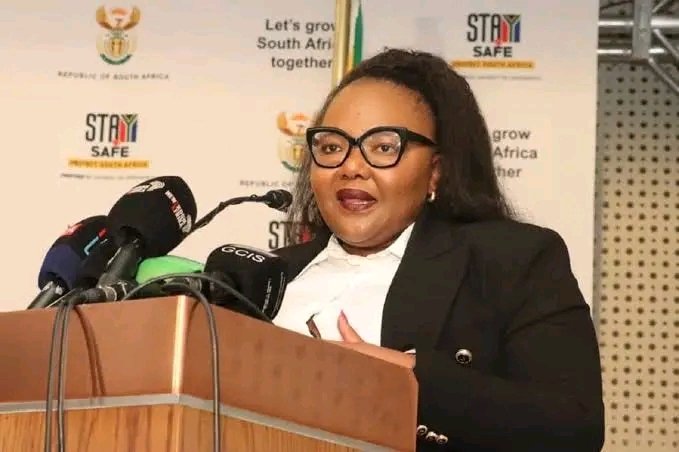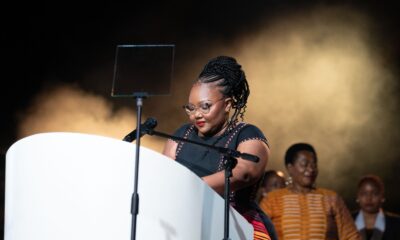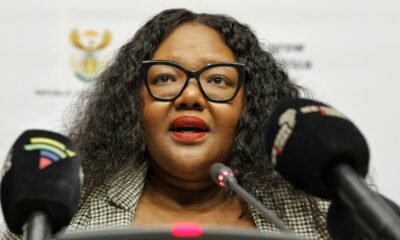News
Sparks Fly in Parliament as Gwarube and Maimane Battle Over Matric Pass Rates

It was a fiery afternoon in South Africa’s National Assembly, where the future of the country’s education system took center stage. Basic Education Minister Siviwe Gwarube and Build One South Africa (BOSA) leader Mmusi Maimane found themselves at opposite ends of a debate that has been brewing for years — the infamous 30% matric pass mark.
Their exchange was more than just political theatre. It was a mirror reflecting the frustration of a nation desperate to understand whether South Africa’s school system is preparing learners for life or simply pushing them through.
A Familiar Fight with New Faces
This wasn’t the first time the two have locked horns, but it was the first time they did so face-to-face in Parliament. Gwarube, a recent appointee to the Basic Education portfolio and once a DA colleague of Maimane, found herself in the crosshairs as Maimane pressed her for answers on curriculum reform and the long-awaited consultative council.
Maimane wanted clarity: when would this council, promised months ago, finally convene to address deep-rooted issues like the 30% pass threshold, which he argued gives learners a false sense of achievement?
The 30% Pass Rate: Myth or Misrepresentation?
In response, Gwarube aimed to correct what she called a misleading narrative. “Matriculants are not simply required to get 30% to pass,” she explained. “The reality is that students must achieve 40% in four subjects and 30% in three others.”
She shared a striking figure: of the more than 724,000 learners who sat for their exams last year, only 189 scraped through with the bare minimum. “That’s 0.000%,” she pointed out. “Let’s not reduce the entire education debate to a misleading number.”
But for Maimane, that wasn’t enough.
A Curriculum Still Stuck in the Past?
He argued that the true problem lies in the way learners are assessed — particularly in subjects that matter most for South Africa’s growth: mathematics, science and technology.
Quoting damning stats, Maimane noted that just 30% of the 251,488 learners who wrote math exams last year scored above 50%. Physical science results, he said, were even worse.
“South Africa needs more engineers, scientists and problem solvers. How can we build that pipeline if we accept mediocrity in these critical subjects?” he asked. “We can’t just assess whether learners are passing — we must ask how well they’re passing and if they’re ready for the real world.”
Gwarube’s Bigger Picture
Gwarube didn’t shy away from the challenge. She agreed that performance in subjects like maths and science needs urgent attention, but pushed back on the idea that changing the pass mark alone would solve anything.
“Focusing only on matric is short-sighted,” she said. “We need to build from the bottom up. Children need to be able to read for meaning by age 10. They need a solid foundation before we can expect them to excel in complex subjects.”
She also confirmed that nominations for the long-awaited education advisory council had closed in January and the final list of members would be revealed soon, pending Cabinet approval.
A Tug-of-War Over Accountability
Maimane wasn’t convinced. “If we don’t shift how we approach math and science, how we assess, how we challenge learners — are you prepared to take accountability for the consequences?” he asked pointedly.
Gwarube remained calm but firm. “We won’t improve outcomes by simply raising the bar at the end. We must invest in the full journey — from the early years of schooling right through to Grade 12.”
The Bigger Battle: Quality Over Optics
At the heart of the debate is a deeper question: What kind of education system does South Africa want?
Gwarube called for a systemic overhaul, not quick fixes. “It’s not about changing a number. It’s about changing how we teach, how we support learners, and how we prepare them for life beyond school.”
Maimane, on the other hand, demanded urgency — arguing that South Africa doesn’t have the luxury of time.
What’s Next for South Africa’s Learners?
As this spirited exchange showed, South Africa’s education debate is far from over. Whether you stand with Gwarube’s long-term vision or Maimane’s call for immediate reform, one thing is clear: the current system leaves too many behind.
The success of our future engineers, scientists, and leaders depends on bold, collaborative action — not just parliamentary debates.
{Source: IOL}
Follow Joburg ETC on Facebook, Twitter , TikTok and Instagram
For more News in Johannesburg, visit joburgetc.com



























